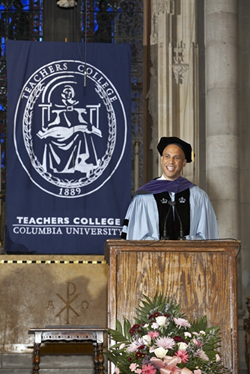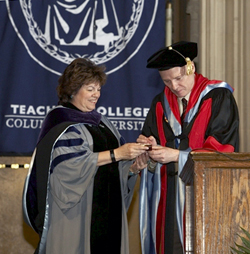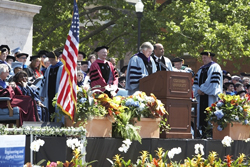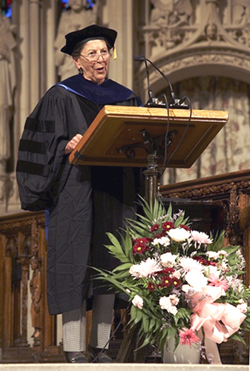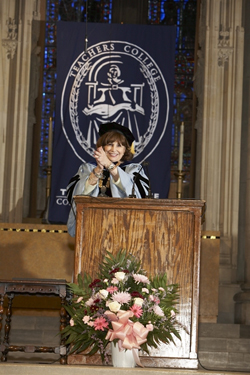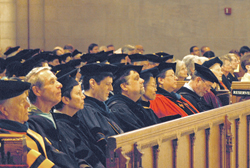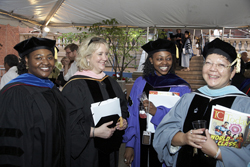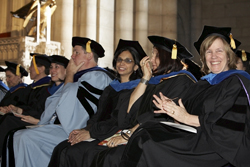"Be the Change You Want to See"
At TC's convocation ceremonies, graduates were challenged to take action amid challenging times
“Will you resign yourselves to the world as it is? Will you submit to conditions, or will you stand up for who you are and take responsibility to be a force for change?”
With that challenge to Teachers College graduates, Newark Mayor Cory Booker set an energetic and compelling tone for the College’s 2009 convocation exercises held on May 19 and 20 at Riverside Church
By turns funny and powerfully eloquent, Booker, who also serves on TC’s Board of Trustees, lauded the graduates for choosing to dedicate their lives to the service of others, but made clear that their charge was to take action everyday to ensure that the country lived up to its ideals.
“You must love recklessly and with abandon,” Booker said in his remarks at the first of two ceremonies held for master’s degree recipients on May 19. “If you live that way to the best of your abilities, you will bring hope to despair, light onto darkness, you will send ripples of love out onto children yet unborn. This is ultimately a call to be an instrument of love. If you love that way, then as children all over America work their way to their graduation, you will bring truth to the words they say every single morning that we are one nation, under God, indivisible, with liberty and justice for all.”
More than 1,900 master’s degree students and more than 200 doctoral degree recipients, hailing from 44 states and countries as far-flung as Bahrain , Ghana and Mongolia
Gentile, a preeminent scholar whose field did not exist when she received her doctorate in the late 1950s, offered TC’s newly minted doctoral students hard-earned advice: “Hold fast to the questions and issues about which you are passionate.”
All three ceremonies packed the pews of Riverside ’s vaulting, Gothic nave, setting it awash in Columbia
In her remarks, TC President Susan Fuhrman also took up the call to action. Acknowledging the tumultuous events of the past year that shook the financial markets and the country, she quoted the famous opening of Charles Dickens’ historical novel A Tale of Two Cities:
“It was the best of times,
it was the worst of times;
it was the age of wisdom,
it was the age of foolishness; it was the epoch of belief,
it was the epoch of incredulity;
it was the season of Light,
it was the season of Darkness;
it was the spring of hope,
it was the winter of despair; we had everything before us, we had nothing before us;
we were all going directly to Heaven, we were all going the other way.”
Dickens’ description of the French Revolution captured both the darkness and hope in our own conflicted times, Fuhrman said.
“As a society, we are working more at building consensus, at listening to one another, at cooperating. There is a growing recognition that the many challenges we face are inextricably linked—that questions of the economy, the environment, health care and education cannot be dealt in isolation. Out of the calamities of this past year, there has arisen an exceptional and unique opportunity to make significant and lasting changes in our society, in virtually every major area of social endeavor.”
Given that unique opportunity, Fuhrman advised graduates to “get out there and participate. Don’t miss the chance to be at the table in what could be an epoch of intensive social improvement—because I can tell you, after many years in the worlds of policy and practice, that such moments do not come around often.”
Fuhrman also told the stories of several students from throughout TC’s programs whose exploits brought into sharp relief the accomplished nature of the graduating class. Those she mentioned included Eric Oberstein, a master’s degree student in arts administration, who during his time at TC served as Assistant Director of the Afro-Latin Jazz Alliance; and Traci Stein, a doctoral student whose dissertation analyzed the effectiveness of a therapy for traumatized adolescents in AIDS- and war-ravaged Uganda
“By virtue of the passion that brought them here and of the desire to make an impact on the world, our students are constantly engaged in research and refinement of their governing ideas,” Fuhrman said. “Whether they end up working in think tanks, in government or alone in classrooms, we can count on them to continue that process of personal growth and of striving to make a greater impact.”
If both Booker and Fuhrman called on the graduates to seize the moment and take action in a most challenging of times, it was Shapiro who broadened the focus to the global stage, reminding graduates that the world in which they will conduct their work is inextricably linked.
Speaking at the evening master’s degree ceremony, Shapiro said that she was struck by the fact that the College had devoted the entire issue of its magazine, TC Today, which was distributed to everyone in attendance, to highlighting its initiatives throughout the world. It was a fitting focus, she said, as graduates prepared to enter into that world.
“We anthropologists tend to like that sort of thing,” Shapiro said. “This concern for global issues facing education is a timely one and it seems to me quite consonant with this institution’s rootedness in a city as cosmopolitan as New York
The two student speakers at the master’s degree ceremonies also brought an international dimension. Hareem Khan, a student in the Curriculum and Teaching Program, was from Pakistan , and Nisrin Elamin, a student in the Comparative and International Education Program, was born in Sudan
Khan told graduates that she planned to return to Pakistan
Elamin, meanwhile, focused on the plight of immigrants and the poor around the world. She told graduates that there are 774 million people throughout the world who cannot read or write, while 63 percent of the people in prison in the United States
“Behind these numbers are countless stories of fathers, grandmothers, restaurant workers and home health aides right here in New York City
At the doctoral ceremony, each Ph.D. and Ed.D. candidate strode to the chancel to be hooded by Provost Tom James and congratulated by Fuhrman. They were preceded by Gentile, a member of the TC faculty for 44 years who retired in spring 2008. As a graduate student in the 1950s interested in studying the motor functions of high-performance athletes and dancers, Gentile said she was counseled to prepare for unemployment. But in 1957, the Russians launched Sputnik, the space race was on, and there was a big push to improve American study and teaching of science and math. “My peculiar interest in motor competencies suddenly fit,” she said.
She set up research labs in Russell and Thorndike halls and later was encouraged to apply the outcomes of her motor research to rehabilitation. Gentile was an early advocate of neuroplasticity, the idea that injured parts of the brain can reorganize following trauma, shifting lost functions to new regions where they can be recovered.
Despite the current economic and geopolitical turmoil, Gentile called on the graduates to persevere. “Sometimes a crisis opens new and exciting possibilities,” she said. “I wish you courage and good fortune facing these challenges.”
Near the end of his speech, Booker told the graduates that democracy “is not a spectator sport” to be watched on TV. Instead, the former Stanford University football player urged students to get in the game by taking up the mantle of freedom and justice—and, borrowing the words of Mohandas Gandhi, be the change they wished to see in the world.
“Class of 2009, if you can live your life in accordance with the highest of your being, if you can be the change that you want to see in the world, if you can be conscious that everything in you is a choice between acceptance and change, then transformative things will happen.”
To view convocation and interviews with graduates, visit www.tc.edu/graduates.
Published Monday, Jun. 22, 2009
